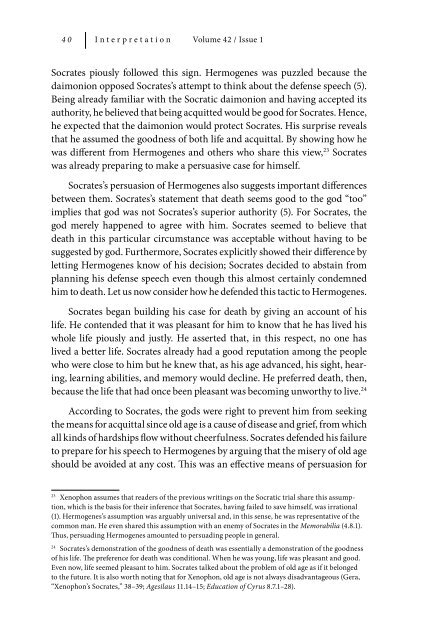Fall 2015
Vol_42_1
Vol_42_1
- No tags were found...
You also want an ePaper? Increase the reach of your titles
YUMPU automatically turns print PDFs into web optimized ePapers that Google loves.
4 0 I n t e r p r e t a t i o n Volume 42 / Issue 1<br />
Socrates piously followed this sign. Hermogenes was puzzled because the<br />
daimonion opposed Socrates’s attempt to think about the defense speech (5).<br />
Being already familiar with the Socratic daimonion and having accepted its<br />
authority, he believed that being acquitted would be good for Socrates. Hence,<br />
he expected that the daimonion would protect Socrates. His surprise reveals<br />
that he assumed the goodness of both life and acquittal. By showing how he<br />
was different from Hermogenes and others who share this view, 23 Socrates<br />
was already preparing to make a persuasive case for himself.<br />
Socrates’s persuasion of Hermogenes also suggests important differences<br />
between them. Socrates’s statement that death seems good to the god “too”<br />
implies that god was not Socrates’s superior authority (5). For Socrates, the<br />
god merely happened to agree with him. Socrates seemed to believe that<br />
death in this particular circumstance was acceptable without having to be<br />
suggested by god. Furthermore, Socrates explicitly showed their difference by<br />
letting Hermogenes know of his decision; Socrates decided to abstain from<br />
planning his defense speech even though this almost certainly condemned<br />
him to death. Let us now consider how he defended this tactic to Hermogenes.<br />
Socrates began building his case for death by giving an account of his<br />
life. He contended that it was pleasant for him to know that he has lived his<br />
whole life piously and justly. He asserted that, in this respect, no one has<br />
lived a better life. Socrates already had a good reputation among the people<br />
who were close to him but he knew that, as his age advanced, his sight, hearing,<br />
learning abilities, and memory would decline. He preferred death, then,<br />
because the life that had once been pleasant was becoming unworthy to live. 24<br />
According to Socrates, the gods were right to prevent him from seeking<br />
the means for acquittal since old age is a cause of disease and grief, from which<br />
all kinds of hardships flow without cheerfulness. Socrates defended his failure<br />
to prepare for his speech to Hermogenes by arguing that the misery of old age<br />
should be avoided at any cost. This was an effective means of persuasion for<br />
23<br />
Xenophon assumes that readers of the previous writings on the Socratic trial share this assumption,<br />
which is the basis for their inference that Socrates, having failed to save himself, was irrational<br />
(1). Hermogenes’s assumption was arguably universal and, in this sense, he was representative of the<br />
common man. He even shared this assumption with an enemy of Socrates in the Memorabilia (4.8.1).<br />
Thus, persuading Hermogenes amounted to persuading people in general.<br />
24<br />
Socrates’s demonstration of the goodness of death was essentially a demonstration of the goodness<br />
of his life. The preference for death was conditional. When he was young, life was pleasant and good.<br />
Even now, life seemed pleasant to him. Socrates talked about the problem of old age as if it belonged<br />
to the future. It is also worth noting that for Xenophon, old age is not always disadvantageous (Gera,<br />
“Xenophon’s Socrates,” 38–39; Agesilaus 11.14–15; Education of Cyrus 8.7.1–28).


